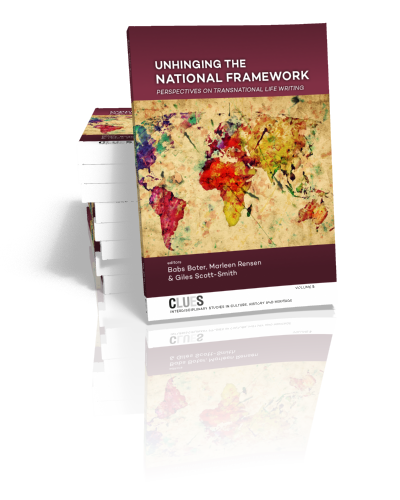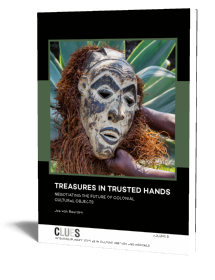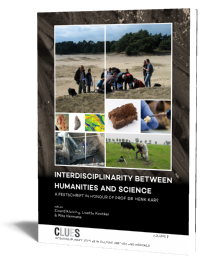Unhinging the National Framework
Perspectives on Transnational Life Writing
Edited by Babs Boter, Marleen Rensen & Giles Scott-Smith | 2020

Unhinging the National Framework
Perspectives on Transnational Life Writing
Edited by Babs Boter, Marleen Rensen & Giles Scott-Smith | 2020
Paperback ISBN: 9789088909740 | Hardback ISBN: 9789088909757 | Imprint: Sidestone Press Academics | Format: 182x257mm | 210 pp. | CLUES no. 5 | Series: CLUES | Language: English | 16 illus. (bw) | 7 illus. (fc) | Keywords: life writing; (auto)biography; postcolonial studies; gender studies; transnationalism/globalization; travel writing; cultural history; social networks | download cover
Read online or downloaded 1321 times
-
Digital & Online access
This is a full Open Access publication, click below to buy in print, browse, or download for free.
-
Buy via Sidestone (EU & UK)
-
Buy via our Distributors (WORLD)
For non-EU or UK destinations you can buy our books via our international distributors. Although prices may vary this will ensure speedy delivery and reduction in shipping costs or import tax. But you can also order with us directly via the module above.
UK international distributor
USA international distributor
-
Bookinfo
Paperback ISBN: 9789088909740 | Hardback ISBN: 9789088909757 | Imprint: Sidestone Press Academics | Format: 182x257mm | 210 pp. | CLUES no. 5 | Series: CLUES | Language: English | 16 illus. (bw) | 7 illus. (fc) | Keywords: life writing; (auto)biography; postcolonial studies; gender studies; transnationalism/globalization; travel writing; cultural history; social networks | download cover
Read online or downloaded 1321 times

We will plant a tree for each order containing a paperback or hardback book via OneTreePlanted.org.
This book focuses on the 20th century lives of men and women whose life-work and life experiences transgressed and surpassed the national boundaries that existed or emerged in the 20th century. The chapters explore how these life-stories add innovative transnational perspectives to the entangled histories of the world wars, decolonization, the Cold War and post-colonialism.
The subjects vary from artists, intellectuals, and politicians to ordinary citizens, each with their own unique set of experiences, interactions and interpretations. They trace the building of socio-cultural and professional networks, the casual encounters of everyday life, and the travel, translation, and preserving of life stories in different media. In these multiple ways the book makes a strong case for reclaiming lost personal narratives that have been passed over by more orthodox nation-state focused approaches.
These explorations make use of social and historical categories such as class, gender, religion and race in a transnational context, arguing that the transnational characteristics of these categories overflow the nation-state frame. In this way they can be used to ‘unhinge’ the primarily national context of history-writing.
By drawing on personal records and other primary sources, the chapters in this book release many layers of subjectivity otherwise lost, enabling a richer understanding of how individuals move through, interact with and are affected by the major events of their time.
“Taking up what the editors refer to as the ‘casual border crossings of everyday life,’ this collection considers how lives are made in, through, beyond, and in spite of, nation-state configurations. The essays demonstrate that transnational encounters – human, material, conceptual, and translational – enable unique and sometimes unexpected contact zones, and further, show how a transnational lens can complicate and unsettle understandings of class, race, gender, and ethnicity, but also, and importantly, life writing and transnationalism themselves.”
Prof. dr. Sonja Boon, Memorial University of Newfoundland, Canada
“This volume is a call to question national contexts as self-evident starting points for life writing. Rather than presenting a limiting method or perspective on the transnational lives of the central figures (and objects) in each chapter, the authors show that unhinging the national framework implies grappling with discursive powers such as archival arrangements, international networks as legacies of past imperial spaces, and inequalities in terms of gender, race, class, and language. Unhinging the national framework also helps demonstrate how national frameworks push and pull, while transnational allegiances add up, overlap, and conflict. The evocative episodes of the lives (and in some cases the deaths) of the volume’s historical actors help us, as readers, to reflect on the continued dominance of national frameworks in our current globalized world, and what they mean in our own lives.”
Prof. dr. Susan Legêne, Vrije Universiteit Amsterdam, Netherlands
Introduction
Babs Boter and Marleen Rensen
Archival traces
Mieke Bouman (1907-1966) and the Jungschläger/Schmidt trials
Ernestine Hoegen
Colonialism, class, and collaboration: A wartime encounter on Java
Eveline Buchheim
“The Voortrekkers, on their way to Pretoria, 1952”: Doing Race in Life Writing from South Africa to the Netherlands
Barbara Henkes
Networking
Sleepwalking to a poem: A theory of Adrienne Rich’s translations from the Dutch
Diederik Oostdijk
W.E.B. Du Bois at Ons Suriname: Amsterdam transnational networks and Dutch anti-colonial activism in the late 1950s
Lonneke Geerlings
Following the letters: Emile de Laveleye’s transnational correspondence network
Thomas D’haeninck
Circulation
Booker T. Washington’s Up From Slavery in the Dutch Empire, 1902-1995
Marijke Huisman
The production and contestation of biography: New approaches from South Africa
Ciraj Rassool
Ordinary lives: teaching history with life narratives in transnational perspective
Nancy Mykoff
Starring Morgenland! The life and work of Jan Johannes Theodorus Boon (1911-1974)
Edy Seriese
Positionings
“She is English, isn’t she?”: transnationality as part of Cissy van Marxveldt’s self-presentation
Monica Soeting
“A caveman in a canal house”: The rejection of transnationalist biography in Hafid Bouazza’s A Bear in Fur Coat
Sjoerd-Jeroen Moenandar
Afterword: Reflections from a diplomatic historian
Giles Scott-Smith
Dr. Babs Boter
Babs Boter is Assistant Professor at the Faculty of Humanities, Vrije Universiteit Amsterdam. Her research and teaching focus on life writing, travel writing and Diaspora Studies. She is initiator and convenor of the international expert group Unhinging the National Framework: Platform for the Study of Life Writing and Transnationalism.
Dr. Marleen Rensen
Marleen Rensen is a Senior Lecturer in Modern European Literature at the European Studies Department of the University of Amsterdam, The Netherlands. She specializes in life writing and modern literature and has a particular interest in the lives of French and German artists in the twentieth and twenty-first century.
Prof. dr. Giles Scott-Smith
Giles Scott-Smith holds the Roosevelt Chair in New Diplomatic History at Leiden University, The Netherlands. In 2017, as one of the organisers of the New Diplomatic History network (www.newdiplomatichistory.com), he became one of the founding editors of Diplomatica: A Journal of Diplomacy and Society published with Brill.
Abstract:
This book focuses on the 20th century lives of men and women whose life-work and life experiences transgressed and surpassed the national boundaries that existed or emerged in the 20th century. The chapters explore how these life-stories add innovative transnational perspectives to the entangled histories of the world wars, decolonization, the Cold War and post-colonialism.
The subjects vary from artists, intellectuals, and politicians to ordinary citizens, each with their own unique set of experiences, interactions and interpretations. They trace the building of socio-cultural and professional networks, the casual encounters of everyday life, and the travel, translation, and preserving of life stories in different media. In these multiple ways the book makes a strong case for reclaiming lost personal narratives that have been passed over by more orthodox nation-state focused approaches.
These explorations make use of social and historical categories such as class, gender, religion and race in a transnational context, arguing that the transnational characteristics of these categories overflow the nation-state frame. In this way they can be used to ‘unhinge’ the primarily national context of history-writing.
By drawing on personal records and other primary sources, the chapters in this book release many layers of subjectivity otherwise lost, enabling a richer understanding of how individuals move through, interact with and are affected by the major events of their time.
“Taking up what the editors refer to as the ‘casual border crossings of everyday life,’ this collection considers how lives are made in, through, beyond, and in spite of, nation-state configurations. The essays demonstrate that transnational encounters – human, material, conceptual, and translational – enable unique and sometimes unexpected contact zones, and further, show how a transnational lens can complicate and unsettle understandings of class, race, gender, and ethnicity, but also, and importantly, life writing and transnationalism themselves.”
Prof. dr. Sonja Boon, Memorial University of Newfoundland, Canada
“This volume is a call to question national contexts as self-evident starting points for life writing. Rather than presenting a limiting method or perspective on the transnational lives of the central figures (and objects) in each chapter, the authors show that unhinging the national framework implies grappling with discursive powers such as archival arrangements, international networks as legacies of past imperial spaces, and inequalities in terms of gender, race, class, and language. Unhinging the national framework also helps demonstrate how national frameworks push and pull, while transnational allegiances add up, overlap, and conflict. The evocative episodes of the lives (and in some cases the deaths) of the volume’s historical actors help us, as readers, to reflect on the continued dominance of national frameworks in our current globalized world, and what they mean in our own lives.”
Prof. dr. Susan Legêne, Vrije Universiteit Amsterdam, Netherlands
Contents
Introduction
Babs Boter and Marleen Rensen
Archival traces
Mieke Bouman (1907-1966) and the Jungschläger/Schmidt trials
Ernestine Hoegen
Colonialism, class, and collaboration: A wartime encounter on Java
Eveline Buchheim
“The Voortrekkers, on their way to Pretoria, 1952”: Doing Race in Life Writing from South Africa to the Netherlands
Barbara Henkes
Networking
Sleepwalking to a poem: A theory of Adrienne Rich’s translations from the Dutch
Diederik Oostdijk
W.E.B. Du Bois at Ons Suriname: Amsterdam transnational networks and Dutch anti-colonial activism in the late 1950s
Lonneke Geerlings
Following the letters: Emile de Laveleye’s transnational correspondence network
Thomas D’haeninck
Circulation
Booker T. Washington’s Up From Slavery in the Dutch Empire, 1902-1995
Marijke Huisman
The production and contestation of biography: New approaches from South Africa
Ciraj Rassool
Ordinary lives: teaching history with life narratives in transnational perspective
Nancy Mykoff
Starring Morgenland! The life and work of Jan Johannes Theodorus Boon (1911-1974)
Edy Seriese
Positionings
“She is English, isn’t she?”: transnationality as part of Cissy van Marxveldt’s self-presentation
Monica Soeting
“A caveman in a canal house”: The rejection of transnationalist biography in Hafid Bouazza’s A Bear in Fur Coat
Sjoerd-Jeroen Moenandar
Afterword: Reflections from a diplomatic historian
Giles Scott-Smith
Dr. Babs Boter
Babs Boter is Assistant Professor at the Faculty of Humanities, Vrije Universiteit Amsterdam. Her research and teaching focus on life writing, travel writing and Diaspora Studies. She is initiator and convenor of the international expert group Unhinging the National Framework: Platform for the Study of Life Writing and Transnationalism.
Dr. Marleen Rensen
Marleen Rensen is a Senior Lecturer in Modern European Literature at the European Studies Department of the University of Amsterdam, The Netherlands. She specializes in life writing and modern literature and has a particular interest in the lives of French and German artists in the twentieth and twenty-first century.
Prof. dr. Giles Scott-Smith
Giles Scott-Smith holds the Roosevelt Chair in New Diplomatic History at Leiden University, The Netherlands. In 2017, as one of the organisers of the New Diplomatic History network (www.newdiplomatichistory.com), he became one of the founding editors of Diplomatica: A Journal of Diplomacy and Society published with Brill.
-
Digital & Online access
This is a full Open Access publication, click below to buy in print, browse, or download for free.
-
Buy via Sidestone (EU & UK)
-
Buy via our Distributors (WORLD)
For non-EU or UK destinations you can buy our books via our international distributors. Although prices may vary this will ensure speedy delivery and reduction in shipping costs or import tax. But you can also order with us directly via the module above.
UK international distributor
USA international distributor
- Browse all books by subject
-
Search all books

We will plant a tree for each order containing a paperback or hardback book via OneTreePlanted.org.
You might also like:
© 2025 Sidestone Press KvK nr. 28114891 Privacy policy Sidestone Newsletter Terms and Conditions (Dutch)








